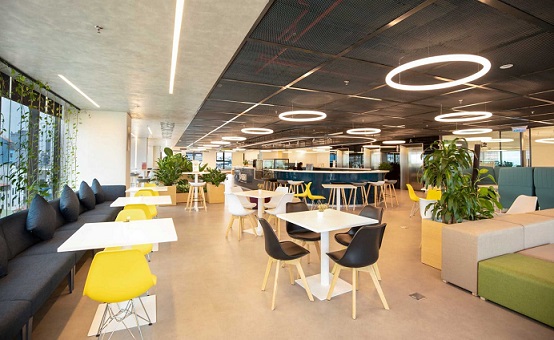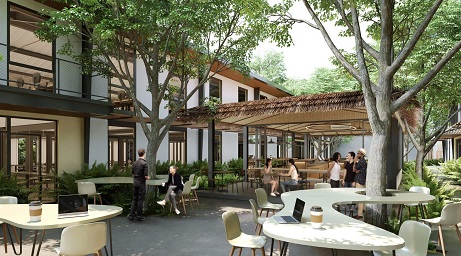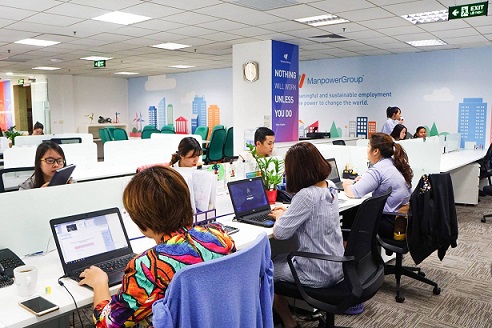Daan van Rossum, CEO at FlexOS and Dreamplex has recently shared a number of interesting facts with ManpowerGroup Vietnam on hybrid work and how to overcome the challenge of the Hybrid Paradox.
Organizations around the globe are adapting to the new normal with hybrid work for their employees as a rising trend. Are your organization ready for those “tribes” that accommodate different interests and working styles of the employees?
Catch up with this latest trend via ManpowerGroup Vietnam’s freshly released interview.
Could you suggest the frequency of hybrid work to attract and retain talent while still creating strong connections at work?
Across the world and the region, it seems like most companies are netting out at 2-3 days per week in the office.
Apple, for example, just mandated employees to come back to the office with two fixed days and one day depending on the need of individual teams. One of the companies we spoke to during our Singapore Hybrid Work Roundtable, does 3 days fixed in the office.

It seems like coming in all together, or at least with your team, a few times per week strikes the right balance between giving people the flexibility they want while still fostering connection, community, and culture.
At the end of the day, the most important thing is that companies look at the work that needs to be completed by when and how it best gets done. Fears that productivity would drop due to hybrid work, for example, quickly proved not to be true. And I think we all know that we're working more than ever, especially when you don't have to commute.
So when and how often should we come into the office? It really depends on the company, the industry they're in, and the roles within the company. For example, engineers work effectively and easily from home and are probably more productive there, whereas for HR and finance, working from home can only happen on very selective days.
Could you please explain more on The Hybrid Paradox? How to balance the company's needs and employee satisfaction?
So according to Ben Hamley, a work futurist at JLL, technology allows us to be hyperconnected, enabling remote work from anywhere in the world. These advances bring significant benefits, such as that employees are now more engaged and committed to working; they have a clearer sense of purpose; they are empowered, supported, and encouraged to take initiatives; and they are enthusiastic about changes.
On the other hand, the lack of face-to-face interactions has made employees feel less connected to their coworkers than ever before, bringing about substantial mental burdens. Or, in Ben's words: "the 'more hybrid' someone's work pattern is, the more they reported feeling overwhelmed by a huge mental burden and isolated, lacking strong connections with colleagues."
Recent Microsoft research tells the same story about remote teams. In their study, only half of employees have strong relationships with their direct teams, while even fewer (42%) have such relationships with other teams. From research conducted by Humu, with the shift towards more hybrid and part-time workplaces, a growing majority of employees say that relationships with colleagues, collaboration, and communication with teammates are the three most challenging aspects of hybrid work, even more so than relationships with their managers.
So this is a paradox. On the one hand, people want to spend more time at home or in non-office locations. On the other hand - without anyone helping them with the 'why and when to come to the office', they risk being isolated and disconnected.
According to the freshly released ManpowerGroup Vietnam Employment Outlook Survey, the percentage of businesses choosing hybrid work has decreased for H2 as compared to H1. Is this the future trend when employees will gradually return to the office because of lack of work-life balance?
That may be a very Vietnam-specific phenomenon. Elsewhere we see a further increase of companies embracing hybrid work, with McKinsey saying that up to 90% of companies will go hybrid in the next few years.

I also don't think this is driven by employees but rather by employers who say: "now that people can work in the office full-time, they should." It's basically going 'back to normal', missing the great opportunity companies had to take a more employee-centric way of approaching office life and tailoring it to the wants and needs of the employee.
Long commutes, high gas prices, pollution and traffic only make it more attractive for people to work from home, at least partially. However, I agree that no one will want to work from home five days per week and that certain in-office days are still needed. Hence hybrid rather than fully remote. (Which I think will not work for 99.9% of companies.)
What are the solutions to solving the biggest challenge of building relationships for employees in hybrid work?
It's 100% in data and personalized experiences. When we don't know when our favorite colleagues will work where and when we should go to the office, we need a data-centric approach to employee experience and employee engagement.
When we have the right data about individual employees, we can tailor moments where they can meet existing and new like-minded colleagues and continue to build relationships, community, and connections – while strengthening their connection to the company culture.
I explained it in a recent article as follows:
First, collect relevant data on your employees' interests and passions. Who are they? What do they want to do next? What would make it meaningful to them if you organize a cool event?
Second, find communities of like-minded employees within your wider employee base. These could be teams, departments, project groups, or even small circles such as people with similar interests or in similar life stages.
Once you've found these "tribes," create community-specific content like events and activities. Understand what your community needs to thrive and tailor to those needs. At each one of these events, like-minded people will connect with others with similar interests or passions, and grow their roots further into the company. Note: smaller weekly events catering to specific niche topics such as creativity and well-being often trump big monthly gatherings in their effectiveness in engaging people meaningfully.
How does the workspace affect employee performance in hybrid work? What are the characteristics of an effective hybrid workplace?
The workspace becomes critical. I just visited our partners at Savills last week who worked with ADP to create a stand-out hybrid office where there's a clear emphasis on having plenty of unassigned workspace, but also offers spaces to meet, socialize, brainstorm, create, and more.

To that end, the physical office, how you control it, and what happens within it needs to change. A designer said in a Bloomberg article: "As work is slowly becoming more employee-centric, offices should be more like Swiss Army Knives to cater to the employees' various specific needs." The focus in hybrid offices is very much in personalization, adaptability, and tech-enabled spaces and experiences.
The type of spaces that a great modern or hybrid office needs are social (where people can gather and collide), meet (to collaborate online and offline, connect and learn), focus (to get work done), and balance (to find just that.)
It also requires a company to emphasize everyone's role in tackling these hybrid challenges. Line managers and middle managers are more critical than ever, for example, to guide people through all the difficult steps (imagine onboarding in a hybrid office), and to be the energetic connector of people and places.
Image Source: ManpowerGroup Vietnam, Dreamplex

